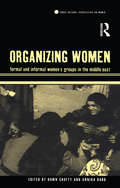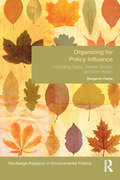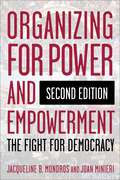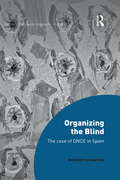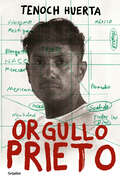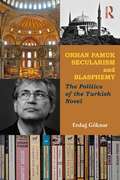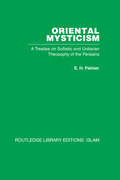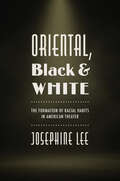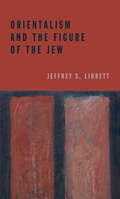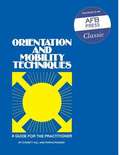- Table View
- List View
Organizing While Undocumented: Immigrant Youth's Political Activism under the Law (Latina/o Sociology #4)
by Kevin EscuderoAn inspiring look inside immigrant youth’s political activism in perilous times Undocumented immigrants in the United States who engage in social activism do so at great risk: the threat of deportation. In Organizing While Undocumented, Kevin Escudero shows why and how—despite this risk—many of them bravely continue to fight on the front lines for their rights. Drawing on more than five years of research, including interviews with undocumented youth organizers, Escudero focuses on the movement’s epicenters—San Francisco, Chicago, and New York City—to explain the impressive political success of the undocumented immigrant community. He shows how their identities as undocumented immigrants, but also as queer individuals, people of color, and women, connect their efforts to broader social justice struggles today. A timely, worthwhile read, Organizing While Undocumented gives us a look at inspiring triumphs, as well as the inevitable perils, of political activism in precarious times.
Organizing Women: Formal and Informal Women's Groups in the Middle East
by Dawn Chatty; Annika RaboWith the creation of the modern nation-state in the Middle East and North Africa, women have been and continue to be manipulated to represent a cultural ideal of perfect womanhood. This is often greatly at odds with the realities of women's lives and aspirations. However, individual women, through careful manipulation of gender relations, often succeed in casting aside the culturally accepted bonds which diminish their lives.Even so, women in groups are deemed unacceptable unless they conform to state mandates. In many countries in the Middle East, women are only legally permitted to form groups which are charitable organizations concerned with the welfare of the disabled or the handicapped. Clearly women in groups are perceived as a threat by the state.This challenging book examines the nature of the relationship between both women and the state and men and the state. It presents a balanced mix of theoretical and empirical research which analyzes both the formal and informal ways in which women have organized themselves, and been organized, in Arab society.
Organizing and Managing Your Research: A Practical Guide for Postgraduates
by Kath Fisher Dr Allan H Ellis Dr Renata Phelps`As research guides go, this is probably the best, most readable and encouraging books for nurses that I have come across....I recommend this volume to students and researchers at all levels, and at all stages of their professional careers. It is an excellent read' - Nursing Standard '[This book] is an ideal reader for someone who is thinking about starting a research project with no or limited previous experience. This is because it outlines the whole research process from start to finish. It also provides useful tips for those who are more experienced' - Nurse Researcher Organizing and Managing Your Research: A Practical Guide for Postgraduates deals with the practical, day-to-day aspects of managing and organizing research. Its focus is on strategies, skills, and systems that increase the efficiency and effectiveness of research practice across all research disciplines. Written in an accessible, non-technical style that speaks directly to the reader in a personal and collegial voice, this text gives practical advice and offers many tips and strategies gleaned from experienced researchers. The written text is accompanied by a website that provides downloadable templates and live links to appropriate sites. Key Features include: - Tips boxes to outline useful strategies and shortcuts based on day-to-day practice of experienced researchers. - Feature examples illustrate the practical application of some of the concepts covered - `Want to know more about ...?' boxes offer pointers to further sources of information - `Over to you' questions at the end of each chapter prompt the student to reflect on how the strategies and concepts can be applied to their own research project
Organizing for Foreign Policy Crises: Presidents, Advisers, and the Management of Decision Making
by Patrick J. HaneyPresidents often assemble ad hoc groups of advisers to help them make decisions during foreign policy crises. These advisers may include the holders of the traditional foreign policy positions--secretaries of state and defense--as well as others from within and without the executive branch. It has never been clear what role these groups play in the development of policy. In this landmark study, Patrick Haney examines how these crisis decision groups were structured and how they performed the tasks of providing information, advice, and analysis to the president. From this, Haney investigates the links between a president's crisis management structure and the decision-making process that took place during a foreign policy crisis. Haney employs case studies to examine the different ways presidents from Truman through Bush used crisis decision-making groups to help manage foreign policy crises. He looks at the role of these groups in handling the Berlin blockade in 1948, the Suez Crisis in 1956, the Tet offensive in 1968, the Yom Kippur War in 1973, and the Panama invasion in 1989, among other crises. He extends our understanding of the organization, management and behavior of the decision-making groups presidents assemble during foreign policy crises. This book will appeal to scholars of the American presidency and American foreign policy. Patrick Haney is Assistant Professor of Political Science, Miami University of Ohio.
Organizing for Policy Influence: Comparing Parties, Interest Groups, and Direct Action (Environmental Politics)
by Benjamin FarrerIn this book, Benjamin Farrer explains how activists can influence the policies they care about, even when they are outnumbered and their issues are ignored. The solution lies in a surprising place: organizational choice. Different types of organizations will be more influential under particular democratic institutions. If they choose the optimal type of organization - given their institutional context - then even minority groups can be influential. Environmentalists are a key example of how small groups can sometimes punch above their weight. Environmentalists in different countries have made different organizational choices. These choices explain whether or not they succeeded in influencing policy. In the empirical chapters that follow, Farrer shows that environmentalists can sometimes be more influential if they form interest groups, but under other institutions, political parties are the optimal organizational choice. Although interest groups are often easier to create, national institutions can sometimes insulate mainstream politicians from niche interest groups. When institutions deny access to interest groups, activists are forced to send the stronger signal of party entry. Using a variety of methods, including a formal model, an experiment, and a wealth of empirical data from a variety of settings, Farrer proves that this theory of organizational choice adds to our understanding of several crucial phenomena. First, it helps explain patterns of political participation, by showing the importance of instrumental, rather than purely expressive, motivations for activism. Second, it provides an important modification to Duverger’s (1954) law, by showing that new party entry is a function not only of electoral rules but also of the rules that govern interest groups. Third, it extends research on the role of institutions in determining policy outputs, by showing that policy outcomes are a function of the interaction between organizational choices and institutional context.
Organizing for Power and Empowerment: The Fight for Democracy
by Joan Minieri Jacqueline MondrosThrough entirely new interviews, Organizing for Power and Empowerment: The Fight for Democracy features the voices and experiences of more than forty organizers, telling the stories of twenty geographically and racially diverse progressive organizations. The authors highlight how organizations use innovative new strategies, like targeting corporate expansion, operating at statewide levels, building new structures for electoral action, and establishing community-labor coalitions to win on such critical issues as worker protections, bail reform, immigration, climate change, and affordable housing.The book describes organizations working across a range of issues. The organizers discuss campaigns that activate people around issues that matter in their daily lives—work schedules, bail reform, schools, voting, and affordable housing—and connect them to broader topics such as racial justice, immigration, climate change, criminal justice, and workers’ rights. They share their thoughts on building community organizations and empowering ordinary citizens to become leaders. The book underscores the leadership of Black Americans, other people of color, women, and LGBTQ+ people as they lead campaigns to address the disparate effects of inequality faced by their communities. It provides detailed analysis of the new and effective organizational structures and change strategies, and sheds important new light on foundational organizing practices, innovations, and the challenges and opportunities for progressive social action today.
Organizing the Blind: The Case of ONCE in Spain (Interdisciplinary Disability Studies)
by Roberto Garvía<P>This book is a case study which narrates the history of the National Organization of the Spanish Blind (ONCE), established in 1937 during the Spanish Civil War. Contrary to other affluent countries where most blind people live on welfare benefits, the Spanish blind enjoy full employment. Furthermore, the average income of the Spanish blind is higher than that of the sighted. Why is this so? Why the blind, and not the deaf mute, or any other group of disabled people? This book shows that ONCE answers these questions. <P>The book explains ONCE'S origins, the shifting strategies that the organization has pursued to adapt to an ever-changing environment, its original goals and the way they have mutated and been interpreted, its conflicting relationship with an authoritarian regime, its struggle to find its place in a democratic regime, and its relations with other groups of disabled people. A historical narrative, the book lies at the intersection between disability and organization studies, history and sociology. <P>It will be of interest to all scholars of disability studies, the sociology of work, the history of medicine and contemporary Spanish history.
Organs for Sale: An Ethnographic Examination of the International Organ Trade
by Susanne LundinOrgans for Sale.
Organs for Sale: An Ethnographic Examination of the International Organ Trade
by Susanne LundinIn this book, Susanne Lundin explores the murky world of organ trade. She tracks exploited farm workers in Moldova, prosecutors in Israel and surgeons in the Philippines. Utilizing unique source material she depicts a rapidly growing organ market characterized by both advanced medical technology and human trafficking.
Organs without Bodies: Deleuze and Consequences
by Slavoj ZizekFirst published in 2004. Routledge is an imprint of Taylor & Francis, an informa company.
Organs without Bodies: On Deleuze and Consequences (Routledge Classics)
by Slavoj ZizekWith a new introduction by the author In this deliciously polemical work, a giant of cultural theory immerses himself in the ideas of a giant of French thought. In his inimical style, Zizek links Deleuze's work with both Oedipus and Hegel, figures from whom the French philosopher distanced himself. Zizek turns some Deleuzian concepts around in order to explore the 'organs without bodies' in such films as Fight Club and the works of Hitchcock. Finally, he attacks what he sees as the 'radical chic' Deleuzians, arguing that such projects turn Deleuze into an ideologist of today's 'digital capitalism'. With his brilliant energy and fearless argumentation, Zizek sets out to restore a truer, more radical Deleuze than the one we thought we knew.
Orgullo prieto
by Tenoch HuertaMéxico es un país racista que niega serlo. Con argumentos como “No es racismo, sino clasismo”, “Acá somos todos mestizos” o “Nunca hubo un sistema segregacionista como en Estados Unidos” negamos que hemos perpetuado la discriminación durante generaciones. Tenoch Huerta, actor de reconocido prestigio y portavoz del debate y la lucha antirracista en México desde hace años, se encarga de rebatir estos y otros mitos acerca del racismo en las páginas de Orgullo prieto. En este libro encontrarás una serie de reflexiones sobre las diferentes discriminaciones que sufre un mexicano por su color de piel en distintos ámbitos —el social, el laboral, el familiar—, así como numerosas vivencias personales del autor sobre situaciones en las que ha sido víctima de racismo, pero también en las que ha ejercido las prácticas racistas propias de un problema que México no quiere ver. «Espero que este libro contribuya a ensalzar el orgullo de ser lo que somos, para que no haya un “prieto arrogante”, como me nombran, sino que haya millones de prietos orgullosos en este país.»-Tenoch Huerta
Orhan Pamuk, Secularism and Blasphemy: The Politics of the Turkish Novel
by Erdag GöknarOrhan Pamuk, Secularism and Blasphemy is the first critical study of all of Pamuk’s novels, including the early untranslated work. In 2005 Orhan Pamuk was charged with "insulting Turkishness" under Article 301 of the Turkish penal code. Eighteen months later he was awarded the Nobel Prize. After decades of criticism for wielding a depoliticized pen, Pamuk was cast as a dissident through his trial, an event that underscored his transformation from national literateur to global author. By contextualizing Pamuk’s fiction into the Turkish tradition and by defining the literary and political intersections of his work, Orhan Pamuk, Secularism and Blasphemy rereads Pamuk's dissidence as a factor of the form of his novels. This is not a traditional study of literature, but a book that turns to literature to ask larger questions about recent transformations in Turkish history, identity, modernity, and collective memory. As a corrective to common misreadings of Pamuk’s work in its international reception, Orhan Pamuk, Secularism and Blasphemy applies various analytical lenses to the politics of the Turkish novel, including gender studies, cultural translation, historiography, and Islam. The book argues that modern literature that confronts representations of the nation-state, or devlet, with those of Ottoman, Islamic, and Sufi contexts, or din, constitute "secular blasphemies" that redefine the politics of the Turkish novel. Concluding with a meditation on conditions of "untranslatability" in Turkish literature, this study provides a comprehensive and critical analysis of Pamuk’s novels to date.
Orient: Hero Dog Guide of the Appalachian Trail
by Tom McmahonFrom the Book jacket: This is a true story. Orient was the guide and companion of Bill Irwin, the first blind man to hike the two thousand miles of the Appalachian Trail. Although Orient was bred to be a dog guide, no one could have guessed what a remarkable adventure lay ahead of the German shepherd puppy when he entered the Seeing Eye school. For the first year of his life, Orient was cared for by a little girl who knew that someday he would have to leave her to serve a blind person who needed him. His next home was the Seeing Eye school in Morristown, New Jersey, where he learned to be a guide, helper, and friend. Then came Bill Irwin and a heroic journey of faith over rocks, rivers, and mountains from Georgia to Maine. Orient, Hero Dog Guide of the Appalachian Trail shows the reader, through the eyes of a dog guide, the challenges that a blind person faces every day. And it teaches that with courage, faith, and perseverance you can overcome any adversity and accomplish the impossible. With Picture Descriptions
Oriental Identities in Super-Diverse Britain
by Tamsin BarberThis timely book addresses the experience of the British-born Vietnamese as an overlooked minority population in 'super-diverse' London. Responding to calls for understanding a greater range of experiences and identifications associated with disparate ethnic minority groups in 'super-diverse' urban settings, this empirical research explores a culturally and politically marginalized minority to develop theorizations of less visible minorities. Contributing to the sociology of identity, 'race', ethnicity and migration, Tamsin Barber asks what it means to be Vietnamese in Britain today and how belonging is understood amongst young British-born Vietnamese. Individual experiences, tensions and opportunities of being both invisible and racially visible are explored through rich, detailed extracts from narrative interviews with the British-born Vietnamese. Oriental Identities in Super-Diverse Britain provides a unique opportunity to theorize the complex ways in which the Vietnamese actively manage identities within the context of coercive Orientalisms and public invisibility in British multiculturalism. Themes of Orientalism, fluidity, agency and resistance are woven together to illustrate how the British-born Vietnamese negotiate a range of shifting and at times contradictory identities in multi-ethnic settings.
Oriental Mysticism: A Treatise On Sufistic And Unitarian Theosophy Of The Persians
by E H PalmerOriginally published 1867. This volume describes not only the basic tenets of the Sufis but also the Ahl i wahdat which was a branch of Sufism. The author’s use of a Persian manuscript treatise by ‘Aziz bin Mohammed Nafasi’ is an indispensable tool, particularly because the author did not merely translate it but gave a clearer and more succinct account of the system. The volume contains an Appendix containing a glossary of allegorical and technical terms in use among Sufiistic writers.
Oriental, Black, and White: The Formation of Racial Habits in American Theater
by Josephine LeeIn this book, Josephine Lee looks at the intertwined racial representations of nineteenth- and early twentieth-century American theater. In minstrelsy, melodrama, vaudeville, and musicals, both white and African American performers enacted blackface characterizations alongside oriental stereotypes of opulence and deception, comic servitude, and exotic sexuality. Lee shows how blackface types were often associated with working-class masculinity and the development of a nativist white racial identity for European immigrants, while the oriental marked what was culturally coded as foreign, feminized, and ornamental. These conflicting racial connotations were often intermingled in actual stage performance, as stage productions contrasted nostalgic characterizations of plantation slavery with the figures of the despotic sultan, the seductive dancing girl, and the comic Chinese laundryman. African American performers also performed common oriental themes and characterizations, repurposing them for their own commentary on Black racial progress and aspiration. The juxtaposition of orientalism and black figuration became standard fare for American theatergoers at a historical moment in which the color line was rigidly policed. These interlocking cross-racial impersonations offer fascinating insights into habits of racial representation both inside and outside the theater.
Orientalism
by Edward W. SaidA groundbreaking critique of the West's historical, cultural, and political perceptions of the East that is—decades after its first publication—one of the most important books written about our divided world. "Intellectual history on a high order ... and very exciting." —The New York TimesIn this wide-ranging, intellectually vigorous study, Said traces the origins of "orientalism" to the centuries-long period during which Europe dominated the Middle and Near East and, from its position of power, defined "the orient" simply as "other than" the occident. This entrenched view continues to dominate western ideas and, because it does not allow the East to represent itself, prevents true understanding.
Orientalism Revisited: Art, Land and Voyage (Culture and Civilization in the Middle East)
by Ian Richard NettonThe publication of Edward Said’s Orientalism in 1978 marks the inception of orientalism as a discourse. Since then, Orientalism has remained highly polemical and has become a widely employed epistemological tool. Three decades on, this volume sets out to survey, analyse and revisit the state of the Orientalist debate, both past and present. The leitmotiv of this book is its emphasis on an intimate connection between art, land and voyage. Orientalist art of all kinds frequently derives from a consideration of the land which is encountered on a voyage or pilgrimage, a relationship which, until now, has received little attention. Through adopting a thematic and prosopographical approach, and attempting to locate the fundamentals of the debate in the historical and cultural contexts in which they arose, this book brings together a diversity of opinions, analyses and arguments.
Orientalism and Islam: European Thinkers on Oriental Despotism in the Middle East and India
by Michael CurtisThrough an historical analysis of the theme of Oriental despotism, Michael Curtis reveals the complex positive and negative interaction between Europe and the Orient. The book also criticizes the misconception that the Orient was the constant victim of Western imperialism and the view that Westerners cannot comment objectively on Eastern and Muslim societies. The book views the European concept of Oriental despotism as based not on arbitrary prejudicial observation, but rather on perceptions of real processes and behavior in Eastern systems of government. Curtis considers how the concept developed and was expressed in the context of Western political thought and intellectual history, and of the changing realities in the Middle East and India. The book includes discussion of the observations of Western travelers in Muslim countries and analysis of the reflections of six major thinkers: Montesquieu, Edmund Burke, Tocqueville, James and John Stuart Mill, Karl Marx, and Max Weber.
Orientalism and the Figure of the Jew
by Jeffrey S. LibrettOrientalism and the Figure of the Jew proposes a new way of understanding modern Orientalism. Tracing a path of modern Orientalist thought in German across crucial writings from the late eighteenth to the mid–twentieth centuries, Librett argues that Orientalism and anti-Judaism are inextricably entangled.Librett suggests, further, that the Western assertion of “material” power, in terms of which Orientalism is often read, is overdetermined by a “spiritual” weakness: an anxiety about the absence of absolute foundations and values that coincides with Western modernity itself. The modern West, he shows, posits an Oriental origin as a fetish to fill the absent place of lacking foundations. This fetish is appropriated as Western through a quasi-secularized application of Christian typology. Further, the Western appropriation of the “good” Orient always leaves behind the remainder of the “bad,” inassimilable Orient.The book traces variations on this theme through historicist and idealist texts of the nineteenth century and then shows how high modernists like Buber, Kafka, Mann, and Freud place this historicist narrative in question. The book concludes with the outlines of a cultural historiography that would distance itself from the metaphysics of historicism, confronting instead its underlying anxieties.
Orientalism's Interlocutors: Painting, Architecture, Photography
by Jill Beaulieu Mary RobertsUntil now, Orientalist art--exemplified by paintings of harems, slave markets, or bazaars--has predominantly been understood to reflect Western interpretations and to perpetuate reductive, often demeaning stereotypes of the exotic East. Orientalism's Interlocutors contests the idea that Orientalist art simply expresses the politics of Western domination and argues instead that it was often produced through cross-cultural interactions. Focusing on paintings and other representations of North African and Ottoman cultures, by both local artists and westerners, the contributors contend that the stylistic similarities between indigenous and Western Orientalist art mask profound interpretive differences, which, on examination, can reveal a visual language of resistance to colonization. The essays also demonstrate how marginalized voices and viewpoints--especially women's--within Western Orientalism decentered and destabilized colonial authority. Looking at the political significance of cross-cultural encounters refracted through the visual languages of Orientalism, the contributors engage with pressing recent debates about indigenous agency, postcolonial identity, and gendered subjectivities. The very range of artists, styles, and forms discussed in this collection broadens contemporary understandings of Orientalist art. Among the artists considered are the Algerian painters Azouaou Mammeri and Mohammed Racim; Turkish painter Osman Hamdi; British landscape painter Barbara Bodichon; and the French painter Henri Regnault. From the liminal "Third Space" created by mosques in postcolonial Britain to the ways nineteenth-century harem women negotiated their portraits by British artists, the essays in this collection force a rethinking of the Orientalist canon. This innovative volume will appeal to those interested in art history, theories of gender, and postcolonial studies. Contributors. Jill Beaulieu, Roger Benjamin, Zeynep Çelik, Deborah Cherry, Hollis Clayson, Mark Crinson, Mary Roberts
Orientation and Mobility Techniques
by Everett Hill Purvis PonderA reference for professional mobility instructors of the techniques developed during the past 30 years.
Orientation and Mobility Techniques: A Guide for the Practitioner
by Purvis Ponder Everett W. HillA large-format manual covering definitions, techniques, and devices, designed for administrators, educators, rehabilitation counselors, and other professionals concerned with the mobility training process. A classic compilation of information on an essential subject.
Orientations
by Kandice Chuh Karen ShimakawaAsian and Asian American studies emerged, respectively, from Cold War and social protest ideologies. Yet, in the context of contemporary globalization, can these ideological distinctions remain in place? Suggesting new directions for studies of the Asian diaspora, the prominent scholars who contribute to this volume raise important questions about the genealogies of these fields, their mutual imbrication, and their relationship to other disciplinary formations, including American and ethnic studies. With its recurrent themes of transnationalism, globalization, and postcoloniality, Orientations considers various embodiments of the Asian diaspora, including a rumination on minority discourses and performance studies, and a historical look at the journal Amerasia. Exploring the translation of knowledge from one community to another, other contributions consider such issues as Filipino immigrants' strategies for enacting Asian American subjectivity and the link between area studies and the journal Subaltern Studies. In a section that focuses on how disciplines--or borders--form, one essay discusses "orientalist melancholy," while another focuses on the construction of the Asian American persona during the Cold War. Other topics in the volume include the role Asian immigrants play in U. S. racial politics, Japanese American identity in postwar Japan, Asian American theater, and the effects of Asian and Asian American studies on constructions of American identity. Contributors. Dipesh Chakrabarty, Kuan-Hsing Chen, Rey Chow, Kandice Chuh, Sharon Hom, Yoshikuni Igarashi, Dorinne Kondo, Russell Leong, George Lipsitz, Lisa Lowe, Martin F. Manalansan IV, David Palumbo-Liu, R. Radhakrishnan, Karen Shimakawa, Sau-ling C. Wong

